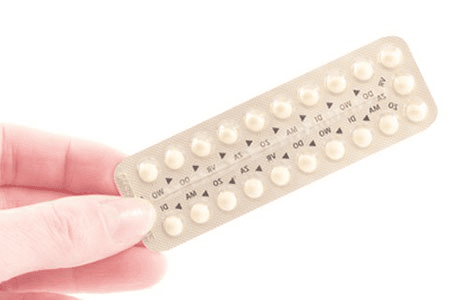This is an automatically translated article.
One of the equally practical issues for mothers in the postpartum period and breastfeeding is the use of appropriate methods of contraception. Hormonal birth control methods are recommended by doctors for nursing mothers because they have almost no effect on the newborn.1. What is hormonal contraception?
Hormonal contraception is a method of using sex hormones such as estrogen and progesterone to suppress ovulation and help women effectively prevent pregnancy. In addition, some hormonal contraceptive methods also have some other effects such as thickening the cervical mucus, making it difficult for sperm to reach an egg. The endometrium thins out, making it harder to keep the fertilized egg attached to the endometrium.Hormonal methods of contraception can be mentioned as combined oral contraceptive pills, oral contraceptive injections, hormonal intrauterine devices, contraceptive patches, contraceptive implants. These are the measures that are commonly chosen by women and have almost no effect on breastfeeding.
2. Is it safe for nursing mothers to use hormonal birth control?
Progestin-only birth control pills are compatible with breastfeeding and are a safe option, if you don't have a medical contraindication that prevents you from taking this hormone.On the other hand, combined oral contraceptives - which contain both estrogen and progestin - are not a good choice for nursing mothers, especially during the first six months, as they can reduce lactation. This applies to all methods that contain estrogen and progestin, such as the combined oral contraceptive pill, the patch (Ortho Evra), and the vaginal ring (NuvaRing).
3. Progestin-only contraceptives (POCs).
Some progestin-only birth control options available to nursing mothers include the progestin-only pill (also known as the minipill), injectable progestin, contraceptive implants, and intrauterine devices. secretion (IUD).Vaginal rings containing only progestin can also prevent pregnancy, but this method is currently rarely used in the Vietnamese market.

Một số lựa chọn tránh thai chỉ chứa progestin dành cho các bà mẹ đang cho con bú bao gồm thuốc viên tránh thai chỉ chứa progestin (còn được gọi là minipill), progestin dạng tiêm, que cấy tránh thai và dụng cụ tử cung chứa nội tiết (IUD)
Because mothers are less likely to conceive while breastfeeding, especially during the first six months, if taken as directed, the minipill is nearly 100% effective when combined with breastfeeding exclusively with breast milk. (In non-breastfeeding women, the minipill failure rate has been estimated to be only 0.5% with adherence to correct use: taking the pill regularly and correctly.) If calculated on the general level of the population, this rate is about 5% higher.
For the minipill to be effective, you must take it around the same time every day. In fact, if you only forget to take your pill for three hours, you must use backup contraception or abstain from sex for the next two days.
For some new mothers, remembering to take a pill at the same time every day seems like an impossible task. If you fall into this category, you may want to consider progestin injections, an implant, or an IUD.
You may have heard about a newer generation of progestin-only pills, which are more effective because it prevents ovulation for 99% of cycles and has a more flexible dosing schedule. You can consult your doctor before using them.
3.2. Progestin-only injectable The progestin-only injectable, commonly known by the trade names Depo-Provera and depo-subQ provera 104, is one of the good alternatives. This method prevents ovulation, and with the right use (meaning you go back to your doctor at the right time for the injection), the drug is more than 99% effective in women who are not breastfeeding. Theoretically, it should be even more effective in nursing mothers.
Depo-Provera is injected into a muscle in the arm or buttocks. Depo-subQ provera 104 is injected into the tissue just under the skin and contains a lower dose of the same progestin.

Thuốc tiêm ngừa thai chỉ chứa progestin thậm chí còn hiệu quả hơn ở các bà mẹ đang cho con bú
Some other things to consider: Progestin injection is associated with a decrease in bone mineral density and this level may be greater with prolonged use of this type of birth control. Both drugs have a decrease in density that may not be fully reversible, and women should not use an injectable progestin for longer than two years.
However, recent studies suggest safe evidence that bone mineral density can be restored following injectable progestin use. Research in this area is underway.
3.3. The contraceptive implant is a method in which a hormone-containing rod is placed under the skin of your arm and the implant continuously releases a small amount of progestin. Implants are more than 99% effective and last for several years (depending on the type of implant used). Your fertility will soon return after the implant is removed.
Currently, implantable products include Implanon and Nexplanon, each using a single soft stick. Once implanted, the rod can stay in place for up to three years and is nearly 100% effective. The downside is that you may have irregular periods or spotting or several days of the month.
3.4. Endocrine IUDs. An IUD is an instrument in the form of a T-shaped rod that is inserted into the uterus. You'll need a follow-up visit 4 to 12 weeks later so your doctor can make sure the IUD is still in place.
Unlike the copper IUD, the Mirena IUD releases a small amount of progestin. Not only are they more than 99% effective as a method of contraception, but most women who use Mirena end up having much less menstrual flow or some will stop menstruating altogether. The progestin IUD can be used for up to five years. In addition, the Mirena IUD is also used in a number of other pathological indications.
4. How much progestin will pass into breast milk, and how will it affect the baby?
If you use progestin-only hormonal birth control, only a small amount of progestin passes into breast milk. For example, with the minipill, the concentration in breast milk is estimated to be between 1 and 6% of the amount in the mother's body.Research to date shows no adverse effects on lactation, or weight gain, infant health or development. Most family planning experts and many organizations - including the World Health Organization, the American Academy of Pediatrics, the American College of Obstetricians and Gynecologists, and the American Academy of Family Physicians recommend this method of birth control. progestin-only contraceptives are compatible with breastfeeding.

Nếu bạn sử dụng biện pháp tránh thai nội tiết tố chỉ có progestin, chỉ một lượng nhỏ progestin đi vào sữa mẹ
5. Can I start using a progestin-only method (POC) right away?
Experts disagree on the best time to start taking POCs. Some experts suggest that breastfeeding mothers should wait 6 weeks after giving birth, when your milk supply is well established and your baby has matured a bit.Others prescribe these methods earlier to women who are not exclusively breastfeeding or are unsure how long they will continue to breastfeed. In general, health care providers recommend that women who are not exclusively breastfeeding begin contraception three weeks after giving birth.
If you are exclusively breastfeeding, there is no reason to start taking hormone supplements 6 weeks before your postpartum visit. But if you don't regularly breastfeed, talk to your doctor about the possibility of starting hormonal birth control earlier. If you decide to wait, be sure to use a condom during this time.
6. Are there any side effects or disadvantages to POCs?
Although a progestin-only method of contraception is considered safe to use while breastfeeding, some women (whether breastfeeding or bottle-feeding) are not good candidates for any method of birth control. any hormonal birth control. Some women who can't use any combined hormonal methods (because of the estrogen component) can still safely use progestin-only methods.The most common side effect of POC is sudden vaginal bleeding, but some women experience other side effects, including weight gain, headache, and nausea.
Unlike condoms, hormonal methods of birth control (with or without estrogen) do not protect against STIs - an important consideration if you not in a monogamous relationship
Discuss the pros and cons with your doctor for advice on your health history and possibly help you choose safe, effective birth control, suitable for you.
Children in the period from 6 months to 3 years old are very susceptible to respiratory problems, respiratory infections, skin diseases and gastrointestinal infections... parents need special attention attention to the care and provision of adequate nutrition for children. The pediatric department at Vinmec International General Hospital is the address for receiving and examining diseases that infants and young children are susceptible to: viral fever, bacterial fever, otitis media, pneumonia in children. With a system of facilities, modern medical equipment, sterile space, minimizing the impact as well as the risk of disease spread, Vinmec will bring satisfaction to customers. and is highly appreciated by industry experts with:
Gathering a team of leading pediatricians: Including leading experts with high professional qualifications (professors, associate professors, doctors, Master's degree), experienced, worked at major hospitals such as Bach Mai, 108.. The doctors are all well-trained, professional, conscientious, knowledgeable about young psychology. In addition to domestic pediatric specialists, the Department of Pediatrics also has the participation of foreign experts (Japan, Singapore, Australia, USA) who are always pioneers in applying the latest and most effective treatment regimens. . Comprehensive services: In the field of Pediatrics, Vinmec provides a series of continuous medical examination and treatment services from Newborn to Pediatric and Vaccine,... according to international standards to help parents take care of their baby's health from birth to childhood. Advanced techniques: Vinmec has successfully deployed many specialized techniques to make the treatment of difficult diseases in Pediatrics more effective: neurosurgery - skull surgery, stem cell transplantation blood in cancer treatment. Professional care: In addition to understanding children's psychology, Vinmec also pays special attention to the children's play space, helping them to play comfortably and get used to the hospital's environment, cooperate in treatment, improve the efficiency of medical treatment.
Please dial HOTLINE for more information or register for an appointment HERE. Download MyVinmec app to make appointments faster and to manage your bookings easily.
Reference source: babycenter.com












